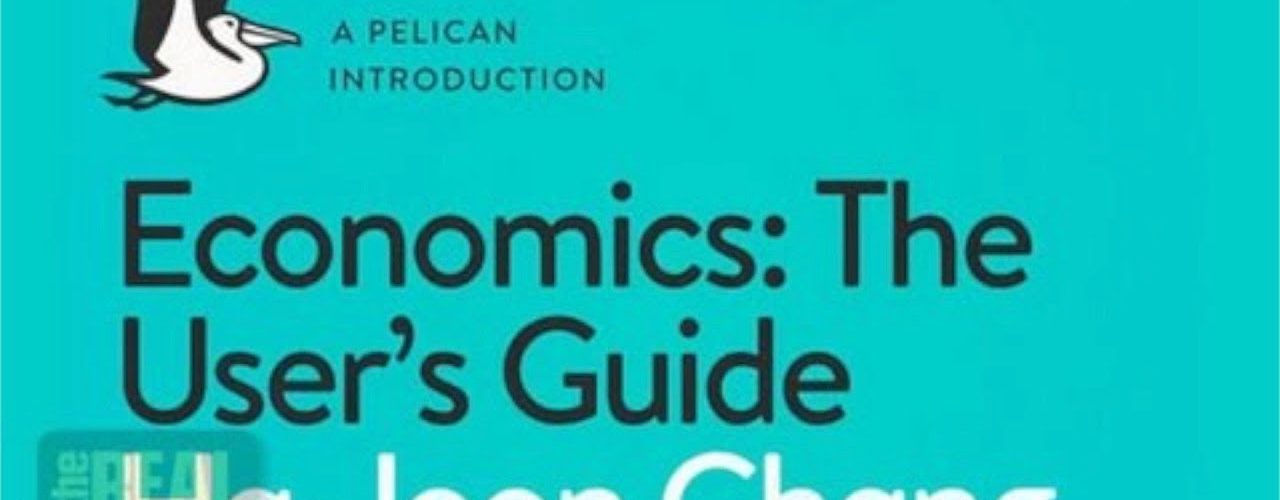Alternative approaches to economics can help us understand the whole economy in ways we would miss if only looking through the Neoclassical lens says Ha-Joon Chang talking in this segment about how that applies to the Marxist, Austrian and Institutionalist Schools and the Developmentalist Tradition.
May 13, 2015 Produced by Lynn Fries
TRANSCRIPT
LYNN FRIES, TRNN: Welcome to The Real News Network. I’m Lynn Fries, in Geneva.
This is Part 4 of a six-part series with economist Ha-Joon Chang. We’re looking into thoughts from his book Economics: The User’s Guide, where he writes that of nine major schools of economic thought, no one of them explains everything. In this segment we look into how many different schools of economic thought each have something to contribute. Our guest, Ha-Joon Chang, joins us from the UK where he teaches economics at the University of Cambridge. Economics: The User’s Guide is his latest book. Earlier books include Kicking Away the Ladder, and 23 Things They Don’t Tell You About Capitalism.
Welcome, Ha-Joon.
HA-JOON CHANG, ECONOMIST, UNIV. OF CAMBRIDGE: Hi.
FRIES: I’d like to ask you to tell us what’s wrong with the view that one approach, the Neoclassical approach, is the right way of doing economics. In other words, what contributions from other major schools of economics show how they’ve differentiated themselves from the Neoclassical approach? Take them one by one, one contribution each. Let’s start with the Marxist School.
CHANG: Yeah. Well, I would say one distinguishing feature of Marxist economics is that it has a more holistic view of human beings in society. So I mean, I already mentioned the importance of work in Marxist economics, because in Marxist economics people are not just consumers. They’re also producers. And what happened in the workplace, whether they are subject to boring work or difficult work, or rewarding work, interesting work, that is a huge element in the determination of human well-being. So that kind of a different perspective on who we are or what human beings are really makes Marxism quite different from Neoclassical economics.
FRIES: And the Austrian School?
CHANG: Now, Austrians are even more pro-market than Neoclassical economists. And they’re often in the same political camp as most Neoclassical economists. I just said most Neoclassical economists because not all Neoclassical economists are in favor of a free market, just think about people like Paul Krugman and Joe Stiglitz. Because Neoclassical economics has this theory called the theory of market failure, which actually can justify a wide range of government intervention.
Insofar as Neoclassical economists defend the free market, their argument, to simplify, is that people know what they’re doing and the government should just leave them alone. This is based on the assumption that people are totally rational and they can take care of themselves.
However, the Austrians defend the free market in a very different way. They do not believe that human beings are rational agents like they are in Neoclassical economics. They emphasize that human beings have very limited rationality, and the world is very complex and uncertain. But then they go on to say that that’s exactly why you cannot have government intervention, because the world is so complex and uncertain the government cannot possibly know what is better for other people, in the same way that no one really knows what is better for anyone else.
So they defend the free market in that kind of way, which I find personally more convincing than the Neoclassical defense based on totally unrealistic assumptions of what human beings are like. But you know, this makes the Austrian defense of a free market a completely different thing. Of course I mean, they often politically work together with the free market wing of Neoclassical school, so people are often confused that they’re the same. But they actually have very different theories.
FRIES: The Institutionalist School?
CHANG: Now, Neoclassical economics has virtually no institution in its background. I mean of course that there’s got to be some kind of property rights so that you at least know who owns what. And you have to protect the market transactions from fraud and things like that. But other than that, there’s really no institutions. It’s just abstract law of supply and demand.
Institutionalist economists are saying that no, that’s not enough for understanding what really goes on in the real world. You need to know what kind of rules are there. How different economic activities are structured and how people’s behavior are constrained and also encouraged by certain types of economic rules and organizational forms that different economies have. And in that it is trying to understand the economy in a more real-world setting than as an abstract system that is almost equivalent to some kind of a system of physical activities, system of physics.
FRIES: And the New Deal was their shining moment?
CHANG: Yes. The shining moment of the Institutionalist School, and here I’m talking about the old, so-called old Institutionalist School, represented by Thorstein Veblen and his followers like, his followers like Wesley Mitchell and so on.
People often think New Deal was a Keynesian policy package, but this is quite misleading. Of course some of Keynes’s ideas were already there in the 1920s and ’30s influencing policymakers. But don’t forget, Keynes’s definitive work, the so-called General Theory, got published only in 1936. The first New Deal was 1933 and the second was 1935. And when you actually look at the contents of the New Deal, I mean, there was all this Keynesian idea of government running deficits in order to make up for the fall in demand caused by the private sector financial crisis. But a lot of the rest of it was ideas from the old Institutional School. It was about social welfare, it was about trade unions. It was about regulating monopolies.
FRIES: The Developmentalist Tradition?
CHANG:Yea, the Developmentalist Tradition, I, I call this group of economists a tradition rather than a school because it’s a collection of somewhat separate intellectual groups united in the idea that what really distinguishes poor countries from more advanced countries is the different abilities that they have in terms of using sophisticated technologies.
Now, when I say that a lot of listeners might say, well, what’s the big deal about that? Don’t we all know that? But actually in Neoclassical theory the assumption is made that there’s only one best practice technology, and every country can actually use it, only that, you know, the poor countries have a lot of labor and very little capital and therefore they need to use more labor-intensive technologies, and rich countries have a lot of capital and relatively little labor, so they need to use more capital-intensive technologies.
So in Neoclassical economic theory, this might sound quite strange, but if a country like Guatemala doesn’t produce things like BMWs it’s not because it cannot, but because it shouldn’t, given that BMW production uses very capital-intensive technologies and Guatemala has very little capital.
So the Developmentalist School is saying actually what really distinguishes poor countries from rich countries is the different abilities to use advanced technologies, and the governments of relatively backward economies need to use public policies like trade protectionism and government subsidies to help the national enterprises to accumulate the abilities to use more advanced technologies. And as some people may know, but probably most people don’t know, this idea was invented by an American. And not just any American, an American who is so famous that everyone knows what he looks like despite the fact that he’s been dead for more than 200 years, who is Alexander Hamilton, the very first Treasury Secretary of the United States of America.
So Hamilton and many of his subsequent followers have developed theories that question this central assumption in Neoclassical economics, that everyone can use the same technology, and have built a whole range of theories questioning that assumption and giving very different policy prescriptions.
FRIES: Let’s do the other schools in the next segment. Please join us for Part 5 of our conversation with Ha-Joon Chang. Ha-Joon Chang, thank you.
CHANG: Thank you.
FRIES: And thank you for joining us on The Real News Network.
END TRANSCRIPT
Ha-Joon Chang, a Korean native, has taught at the Faculty of Economics, University of Cambridge, since 1990. He has worked as a consultant for numerous international organizations, including various UN agencies, the World Bank, and the Asian Development Bank. A best selling author, his latest book is Economics: the User’s Guide. He has published 11 other books, including Kicking Away the Ladder, winner of the 2003 Myrdal Prize. In 2005, Ha-Joon Chang was awarded the 2005 Leontief Prize for Advancing the Frontiers of Economic Thought
Originally published at TRNN



